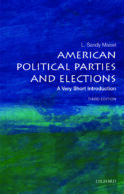7 books to understand the US election [reading list]

7 books to understand the US election [reading list]
As the US Election approaches, explore a few Very Short Introductions to help answer your questions. Get informed before the debates begin, with concise guides on a wide range of topics from American political parties to democracy. Whether you’re a first-time voter or a seasoned political enthusiast, these introductions will provide you with the essential knowledge you need to understand the issues at stake and make an informed decision.
Check out our VSIs for the upcoming election:
 1. Elections: A Very Short Introduction
1. Elections: A Very Short Introduction
Most citizens know how elections work in their own country, but not all elections are created equally. Elections determine who will hold public office and who will have the power to govern. They allow citizens to choose who will make decisions on their behalf and regulate their behavior.
Read Elections: A Very Short Introduction
 2. American Political Parties and Elections: A Very Short Introduction
2. American Political Parties and Elections: A Very Short Introduction
Few Americans and even fewer citizens of other nations understand the electoral process in the United States. Still fewer understand the role played by political parties in the electoral process or the ironies within the system. The third edition of American Political Parties and Elections: A Very Short Introduction provides an inside view of the paradoxical aspects of the American electoral system.
Read American Political Parties and Elections
 3. The U.S. Supreme Court: A Very Short Introduction
3. The U.S. Supreme Court: A Very Short Introduction
For 30 years, Pulitzer Prize-winning journalist Linda Greenhouse chronicled the activities of the U.S. Supreme Court and its justices as a correspondent for the New York Times. In this Very Short Introduction, Greenhouse draws on her deep knowledge of the court’s history and of its written and unwritten rules to show readers how the Supreme Court really works. This third edition tracks the changes in the Court’s makeup over the past decade, including the landmark decisions of the Obama and Trump eras and the emergence of a conservative supermajority.
Read The U.S. Supreme Court: A Very Short Introduction
 4. Democracy: A Very Short Introduction
4. Democracy: A Very Short Introduction
Democracy refers to both ideal and real forms of government. The concept of democracy means that those governed—the demos—have a say in government. But different conceptions of democracy have left many out. Naomi Zack provides a fresh treatment of the history of this idea and its key conceptions.
Read Democracy: A Very Short Introduction
5. The American Presidency: A Very Short Introduction
The American founding fathers were dedicated to the project of creating a government that was both functional and incapable of devolving into tyranny. To do this, they intentionally decentralized decision-making among the legislative, executive, and judiciary branches. They believed this separation of powers would force compromise and achieve their goal of “separating to unify.” This updated edition reviews crucial themes, including democratization of presidential elections, transitioning into and organizing a presidency, challenges in leading the permanent government, making law and policy, and reforming and changing the institution.
Read The American Presidency: A Very Short Introduction
 6. American Politics: A Very Short Introduction
6. American Politics: A Very Short Introduction
American politics seems to grow more contentious and complicated by the day, and whether American democracy works well is hotly debated. Amidst all these roiling partisan arguments and confusing claims and counterclaims, there has never been a greater need for an impartial primer on the basics of the American political system.
Read American Politics: A Very Short Introduction
 7. The U.S. Congress: A Very Short Introduction
7. The U.S. Congress: A Very Short Introduction
Donald A. Ritchie, a congressional historian for forty years, takes readers on a fascinating, behind-the-scenes tour of Capitol Hill, pointing out the key players, explaining their behavior, and translating parliamentary language into plain English. He also explores the essential necessity of compromise to accomplish anything significant in the legislative arena. However, recent events show that political polarization has hardened and produced gridlock, as Ritchie explains in this new edition.
Read The U.S. Congress: A Very Short Introduction
Featured image by Philip Goldsberry via Unsplash.
OUPblog - Academic insights for the thinking world.

Oxford University Press's Blog
- Oxford University Press's profile
- 238 followers



